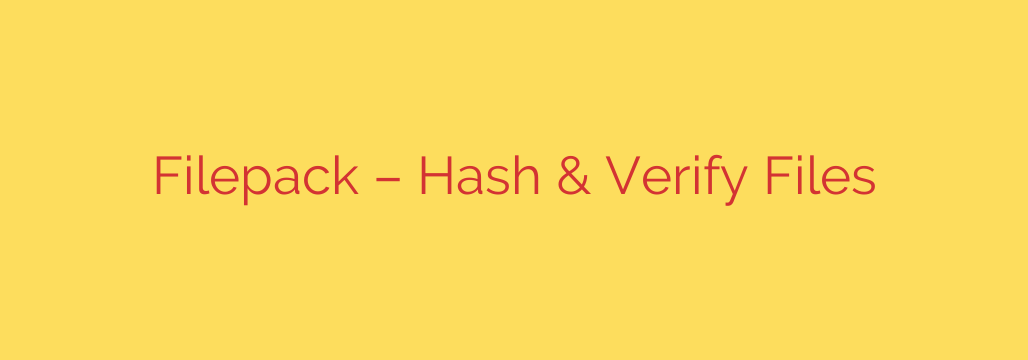
How to Ensure Your Downloaded Files Haven’t Been Tampered With
In our digital lives, we constantly download files – documents, software, media, and more. But how can you be sure that the file you just downloaded is exactly what the source intended you to receive? Could it have been corrupted during transfer? Worse, could it have been intentionally modified to include malware or other malicious content?
Ensuring the integrity and authenticity of your files is a critical step for digital security and reliability. Fortunately, there’s a widely used method to achieve this: file hashing, also known as generating a checksum.
What is File Hashing and Why Use It?
Imagine creating a unique digital fingerprint for every file. No matter how small the change to the file, its fingerprint will be drastically different. This is essentially what file hashing does. It uses mathematical algorithms (like MD5, SHA-1, SHA-256, etc.) to generate a fixed-size string of characters, the “hash,” that is unique to the specific content of the file.
Key reasons why verifying file integrity with hashing is important:
- Security: Ensures the file hasn’t been infected with malware or backdoors since it was originally created or uploaded.
- Reliability: Confirms the file wasn’t corrupted during the download or transfer process.
- Authenticity: Verifies that the file is genuinely from the claimed source and hasn’t been swapped with a fake version.
The Verification Process
The process is straightforward:
- The creator or provider of the file generates a hash for the original, untampered file.
- They make this hash publicly available alongside the download link (often on their website).
- You download the file.
- You use a hashing tool on your computer to calculate the hash of the downloaded file.
- You compare the hash you calculated with the original hash provided by the source.
If the two hashes match exactly, you can be confident that your downloaded file is identical to the original, untampered version. If they don’t match, the file may be corrupted or potentially malicious, and you should not use it.
Key Benefits of Verifying Files
Implementing this simple check offers significant advantages:
- Peace of Mind: Knowing your software installers or important documents are genuine and safe.
- Preventing Malware Infections: Avoiding the installation of compromised software.
- Ensuring Data Accuracy: Guaranteeing that downloaded data files (like databases or large archives) are complete and correct.
How to Verify a File’s Integrity (Actionable Steps)
Verifying a file hash is easier than you might think. While specific tools vary depending on your operating system, the general steps are:
- Locate the Original Hash: Find the MD5, SHA-1, SHA-256, or other hash provided by the file’s source (usually on the download page). Note which hashing algorithm they used.
- Download the File: Get the file you want to verify.
- Use a Hashing Tool:
- Windows: PowerShell (
Get-FileHash) or command prompt (certutil -hashfile). Alternatively, numerous free third-party utilities are available. - macOS: Terminal (
md5,shasum). - Linux: Terminal (
md5sum,sha256sum). - Many online tools also exist, but using a local tool is generally more secure as you aren’t uploading your file.
- Windows: PowerShell (
- Generate the Hash: Run the command or use the tool to calculate the hash of your downloaded file, making sure to use the same algorithm as the original hash.
- Compare Hashes: Carefully compare the hash generated by your tool with the original hash provided by the source. Every character must match.
Critical Security Tip
Always obtain the original hash from the official and trusted source of the file. Don’t rely on hashes found on unofficial forums or third-party sites, as these could potentially be manipulated.
By making file integrity verification a standard practice, especially for crucial downloads like operating system images, software installers, or security patches, you add a powerful layer of security and ensure you’re working with the genuine article.
Source: https://www.linuxlinks.com/filepack-file-hashing-verification/








